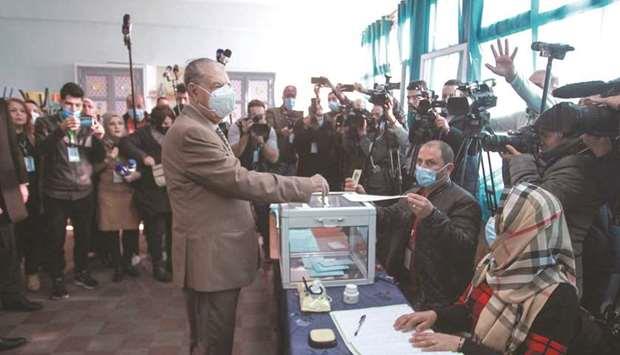
Qatar - Algerians vote in local polls to seal post-Bouteflika 'change'
(MENAFN- Gulf Times) Algerians voted yesterday in local elections seen as key in President Abdelmadjid Tebboune's push to turn the page on the two-decade rule of late president Abdelaziz Bouteflika.
Tebboune called the election“the last step in building a modern state”, and promised an“economically-strong” nation, as he cast his ballot.
The election is the third vote in Algeria under Tebboune, who has vowed to reform state institutions inherited from Bouteflika, who was driven from power by the Hirak pro-democracy protest movement in April 2019.
But despite official campaigns urging Algerians to“make their mark”, the vote for municipal and provincial councils sparked little public interest.
By 1:00pm (1200 GMT), turnout was running at 13%, the election authority ANIE said, with polls to set to close at 7:00pm.
The North African country's rulers are trying to“impose their will despite the embarrassing results of previous elections”, said analyst Mohamed Hennad.
More than 23mn people are eligible to vote, with 115,230 candidates standing for municipal and provincial councils.
Results are expected today.
Campaigning had been muted, despite calls by authorities on Algerians to take part if they“want change” and“institution building”. Omar, an engineer, said he would not cast a ballot.“Nothing will change,” he said.
Yacine, a teacher, said he was voting for rivals of the current Algiers mayor“even if I have no illusions” that they will be better.
Tebboune was elected in a contentious, widely boycotted 2019 ballot months after Bouteflika stepped down under pressure from the army and Hirak rallies.He has vowed to break with past elections marred by widespread claims of fraud.
Algeria's local assemblies elect two-thirds of the national parliament's upper house, with the president appointing the remainder.
Redouane Boudjemaa, a journalism professor at the University of Algiers, said the vote was simply“an attempt to clean up the facade of local councils by changing their members, to benefit the ruling class”, he said.
“Politics at the moment is limited to slogans proclaiming that the country has entered a new era, while all indicators point to the contrary,” Boudjemaa added.
Tebboune, who was a prime minister under Bouteflika, pushed through an amended constitution in November 2020, approved by less than 24% of the electorate, and oversaw a parliamentary election that saw just 23% of voters take part.
His rule has seen a crackdown on journalists and Hirak activists, even as he has packaged major policy moves in response to calls by the protest movement for reform.
He has also faced one diplomatic crisis with Algeria's ex-colonial ruler France, and is embroiled in another with neighbouring Morocco.
Algiers severed diplomatic ties with Rabat in August over the disputed territory of Western Sahara.
Boudjemaa said the main issue at stake was the“huge economic and social challenges of the coming year”.“Several indicators show that the pouvoir (ruling elite) has neither the vision nor the strategy to respond to the crisis,” he said.

Legal Disclaimer:
MENAFN provides the
information “as is” without warranty of any kind. We do not accept
any responsibility or liability for the accuracy, content, images,
videos, licenses, completeness, legality, or reliability of the information
contained in this article. If you have any complaints or copyright
issues related to this article, kindly contact the provider above.


















Comments
No comment